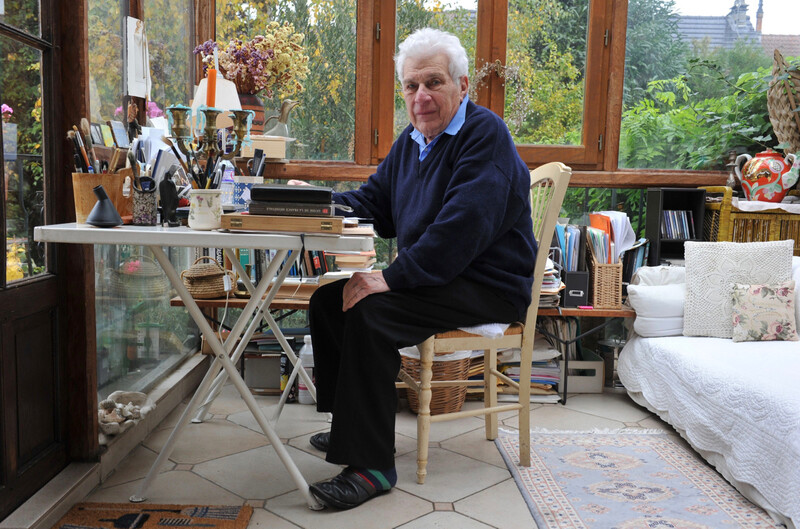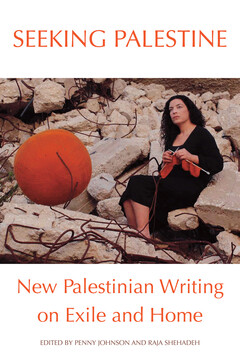The Electronic Intifada 4 January 2017

John Berger, who died on 2 January, pictured at his home in France. The critic and storyteller shaped how a generation of artists saw the world, and led calls for a cultural boycott of Israel.
SIPA“In exactly what arena do we speak when we speak of loved ones who have just died or been killed? Our words seem to us to resonate in a present moment more present than those we normally live.”
John Berger, who died at the age of 90 on 2 January, wrote these words after visiting the great Palestinian poet Mahmoud Darwish’s grave in Ramallah, in a 2009 essay for Threepenny Review.
In the same year, Berger published a translation of Darwish’s long poem Mural with Rema Hammami.
Berger – a British writer who spent much of his adult life in France – began his career as a painter, but it is for writing of an unusually diverse kind that he is best known. His published work includes art criticism, poetry, plays, essays and novels, although latterly he preferred to be known simply as “a storyteller.”
Berger’s most famous book is Ways of Seeing (1972), adapted from a collaborative television series that he presented.
A generation of artists and writers were inspired by Berger’s insistence in the book that what we see in a work of art (and elsewhere) is shaped by a host of assumptions, not least the economic and ideological contexts in which we live.
Preoccupied with Palestine
Berger’s work often combines words and images. He collaborated with the photographer Jean Mohr several times, including on A Seventh Man (1975), about migrant workers in Europe. Berger sought to understand not only what forces people to leave their homes, but also what the Western world looks like to those who perform its “most menial tasks.”
The research for A Seventh Man was funded with half of the winnings from the award of the Booker McConnell Prize (now known as the Booker) for G. (1972), an experimental novel.
Berger, calling himself a “revolutionary writer,” donated the other half to the London-based Black Panther movement, in protest at Booker’s historical role in the slave plantations of the Caribbean.
Berger was increasingly preoccupied with Palestine in his late work.
“I’ve only been actively concerned with Palestine as a writer for about seven years. But the crisis, the injustice, the suffering of the Palestinians, have coexisted alongside my whole life as a writer,” he said in a 2010 interview in the New Statesman.
“The length of this injustice, the lack of recognition of it by the rest of the world, while Israel pursues its own logic, totally regardless of the views of the external world – all this I was not conscious of then, but I am now.”
Berger visited Palestine several times. The poet and critic Rachel Bower notes that in his unpublished letters, which are held in the British Library, Berger wrote “frequently to his correspondents about Palestine.”
In a December 2005 letter to a correspondent, for example, he considered spending his 80th birthday in Gaza as an act of “solidarity.”
Berger also wrote about Palestine in published essays and what he witnessed there permeates his fiction.
His 2008 novel From A to X is based on a fictional correspondence between a political prisoner and his lover. The setting is not explicitly Palestinian, although the book is dedicated to the memory of the assassinated Palestinian novelist Ghassan Kanafani. Berger also gave a moving reading of Kanafani’s “Letter from Gaza” to open the inaugural Palestine Festival of Literature in 2008.
Berger stated his commitment to the Palestinian cause with passion. In “Stones,” an essay in Hold Everything Dear, an earlier version of which was published in the London Review of Books as “A Moment in Ramallah,” he writes: “I unhesitatingly identify myself with the just cause and the pain of those whom the state of Israel (and cousins of mine) are afflicting to a degree that is tragically totalitarian.”
In “Undefeated Despair,” another essay in Hold Everything Dear, Berger writes about how language itself is affected by the occupation: “Everywhere one goes in Palestine – even in rural areas – one finds oneself amongst rubble […] There’s also the rubble of words – the rubble of words that house nothing any more, whose sense has been destroyed […] What is happening is the careful destruction of a people and a promised nation. And around this destruction there are small words and evasive silence.”
Breaking the silence
In response to such silence, Berger led the call for a cultural boycott of Israel.
“As Nelson Mandela has pointed out, boycott is not a principle, it is a tactic depending upon circumstances,” he wrote in 2006. “A tactic which allows people, as distinct from their elected but often craven governments, to apply a certain pressure on those wielding power in what they, the boycotters, consider to be an unjust or immoral way.”
Berger argued scrupulously that each academic, artist or writer must decide how to apply such a boycott: “What is important is that we make our chosen protests together, and that we speak out, thus breaking the silence of connivance maintained by those who claim to represent us.”
Berger found other ways of breaking the silence.
In 2015, he sent a letter to Palestinian students who were protesting at the Beit El checkpoint near Ramallah in the occupied West Bank.
Berger included a recording of Beethoven’s Piano Concerto No. 5 which, he wrote, “carries us to a horizon of happiness we cannot cross.” He noted that the Palestinian students too were “inspired by a vision of happiness they cannot know in their lives. I send the concerto as an arm to be used in their struggle against the Israelis who occupy and colonize their homeland.”
In much of his work, Berger attempted to speak out against injustice and to do so in solidarity with others. His writing has shaped how many individuals see, analyze and try to remake their world.
In his essay on Mahmoud Darwish’s death, Berger writes: “When I sat down in the grass by the edge of his newly dug grave, something unexpected happened. … Mahmoud’s death had lost its weight.”
John Berger’s death will be felt keenly by those he supported, including in Palestine. But, as he wrote of Darwish, “What had remained were his words.”
Tom Sperlinger is author of Romeo and Juliet in Palestine: Teaching Under Occupation, a memoir about teaching at Al-Quds University in the West Bank, which is published by Zero Books.





